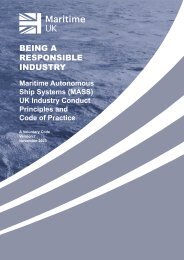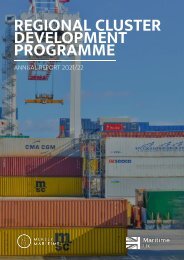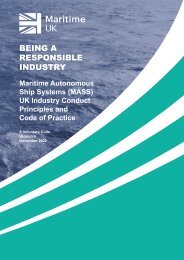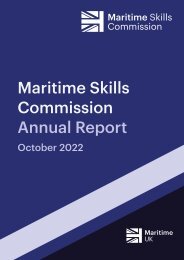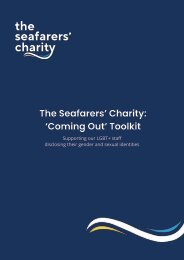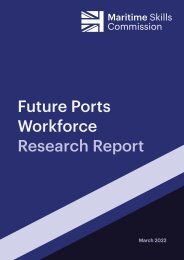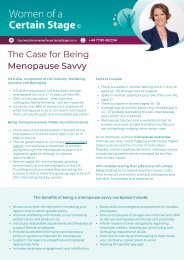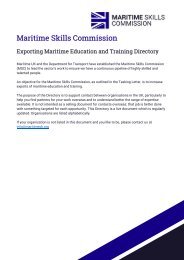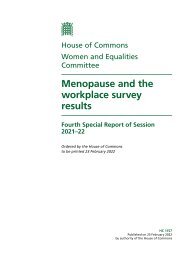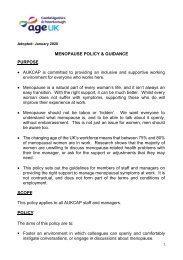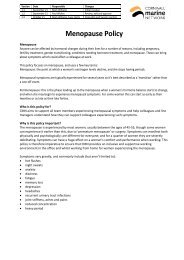code_of_practice_V3_2019
Create successful ePaper yourself
Turn your PDF publications into a flip-book with our unique Google optimized e-Paper software.
4.8.3 Therefore, a key duty <strong>of</strong> the Operator is to develop an effective Risk Assessment system. This will, through a logical<br />
approach, systematically identify risks to personnel and the environment that the MASS could potentially influence.<br />
4.8.4 Risk assessment system outputs will assist in the production <strong>of</strong> the MASS safe systems <strong>of</strong> work and operational<br />
procedures.<br />
4.8.5 Any Risk Assessment system should be simple to understand and implement such that Operators can carry out<br />
effective risk assessments, taking into account any deviations from the perceived ‘normal’ operating envelope.<br />
4.8.6 Further guidance can be sought in Chapter 1 <strong>of</strong> the Code <strong>of</strong> Safe Working Practices for Merchant Seafarers.<br />
4.8.7 Where a MASS uses, transfers or holds bulk quantities <strong>of</strong> substances, materials or liquids that, in the event <strong>of</strong> a<br />
spillage could constitute an environmental impact then the Operator is recommended to develop and implement<br />
a MASS Oil Pollution Emergency Plan (MASSOPEP).<br />
4.9 PROCEDURES TO ENSURE SAFE OPERATION OF MASS<br />
4.9.1 The regulations and rules, not addressed by this Code, which apply to all MASS include, but are not limited to:<br />
n The IMO Instruments;<br />
n Local navigation rules;<br />
n National health and safety regulations;<br />
n The Code <strong>of</strong> Safe Working Practices for Merchant Seamen;<br />
n All relevant national shipping or guidance notices.<br />
4.9.2 The Operator should pay due adherence to the many and varied statutes, legislations, rules, regulations and<br />
Codes <strong>of</strong> <strong>practice</strong> that apply to seafaring. Although the autonomous nature <strong>of</strong> the MASS operation may seem to<br />
negate some requirements, it is the unmanned aspect that should demand increased awareness. Any procedures<br />
produced should pay particular attention to this detail, especially those systems and equipment procedures that<br />
are required to avoid collision.<br />
4.9.3 The Operator should formulate and document procedures to ensure that safe working <strong>practice</strong>s are carried out<br />
in the operation <strong>of</strong> the MASS. These may be in the form <strong>of</strong> checklists, which can be followed by all personnel<br />
irrespective <strong>of</strong> their location.<br />
4.9.4 Simple procedures should be developed for the operation <strong>of</strong> the MASS. These should include, but not be limited to:<br />
n Testing <strong>of</strong> equipment, including propulsion and steering gear, prior to commencing a passage;<br />
n Navigation and handling <strong>of</strong> the MASS;<br />
n Maintenance routines;<br />
n Bunkering operations;<br />
n Watertight/weathertight integrity;<br />
n Stability <strong>of</strong> the MASS;<br />
n Conduct <strong>of</strong> passengers and crew if utilised on board.<br />
4.9.5 Due to the autonomous nature <strong>of</strong> MASS operation the following areas should be considered on top <strong>of</strong> traditional<br />
vessel operating procedures:<br />
n<br />
Anti-Collision, unmanned MASS and the ability to detect and avoid collision;<br />
n Cyber Security, anti-hacking and vessel hijacking for remote operated MASS;<br />
MASS UK Industry Conduct Principles and Code <strong>of</strong> Practice Version 3 35




